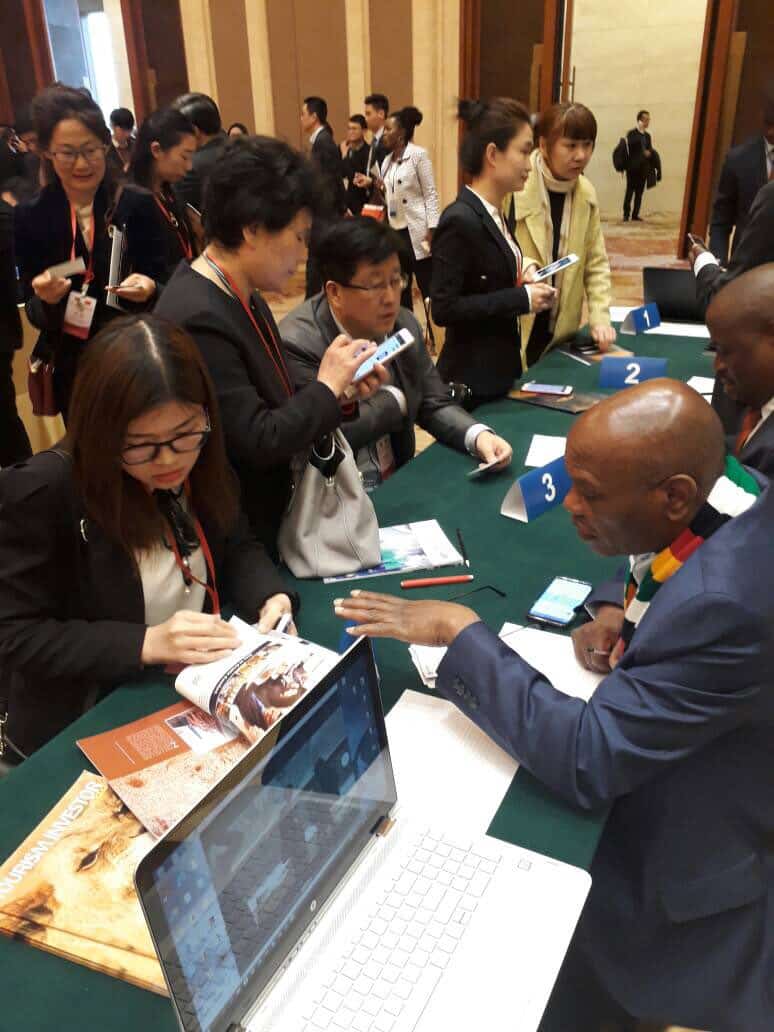By Byron Mutingwende
The recent trip to China by the Zimbabwean delegation led by President Mnangagwa was to project the country as a suitable business destination, stakeholders have said.
Speaking at the joint press conference by the Zimbabwe Tourism Authority (ZTA), ZimTrade and the Zimbabwe Investment Authority (ZIA) in Harare on 17 April 2018, Karikoga Kaseke, the ZTA Chief Executive said the trip opened new lines of communication with China and attracted interest from investors.
“ZimTrade, ZIA and ZTA were part of the high-powered Zimbabwe delegation led by His Excellence President Emmerson Mnangagwa, including 10 Cabinet ministers and 80 private sector companies that visited China in April. It must be clearly stated that the private sector players were not funded by the state and travelled at their own expense. The President spoke to would-be investors and articulated that Zimbabwe was open for business. He emphasised his resolve to strengthen Zimbabwe’s economic relationship with China and there was overwhelming interest from Chinese investors to do business in the country,” Kaseke said.
On the first business forum, there was pre-arranged match-making where the Zimbabwean delegation met more than Chinese 23 business companies that are interested in tourism and other businesses that the Southern African country offers. Currently, Zimbabwe is not visible to China but with the projected image, there is willingness to explore business and investment opportunities.
The ZTA met five big tour operators from China who are selling Africa as a destination for leisure and business. One of the companies is in incentive travel. Under that system, Chinese companies give companies who excel some paid holidays to destinations of their choices. There were promises to extend the incentive travel to Zimbabwe with effect from 2019. In the arrangement, 350 Chinese businessmen will chart a plane to Zimbabwe and three other countries where they will stay for at least 14 days in the country.
“The Chinese hold the tour operators annual conference at which a country to visit is chosen for holding a conference. Zimbabwean has been identified for the 2019 conference. The conference is attended by between 1500 and 2000 people. Such a conference was held in Dubai in 2017. Harare has facilities with capacities to handle such numbers and the Rainbow Towers Hotel is one such with the Harare International Conference,” Kaseke said.
To that effect, there is need to invest in infrastructure like the building of new and expansion of existing hotels. A Chinese company interested in infrastructure development is Touch Holdings, which has a presence in 25 African countries. In Djibouti, it is building a tourism city. The chairman of that company is headed to Zimbabwe in June with other 17 Chinese billionaires to explore business opportunities. Constructing a tourism city costs up to $7 billion.
Allan Majuru, the Acting ZimTrade CEO said there was need to promote the export of value-added goods instead of raw materials like gold and chrome.
“China has a population of 1, 4 billion people and a GDP of over $12 trillion yet 69% of Zimbabwe’s exports come from the South African market. It is logical to tap into the Chinese market, which has vast opportunities for business. We should work towards ending mainly the export of mineral commodities to China and consider growing the export of textiles and clothing, agro-processed goods, horticultural products, citrus, fresh fruits timber and Macadamia nuts,” Majuru said.
He bemoaned the negative perception of the country projected in the international community including China, Europe and the United States of America. He urged stakeholders to focus more on business as compared to political issues so as to turn around the economy, which is on a negative growth trajectory.
Richard Mubaiwa, the CEO of ZIA said the Chinese trip was a platform for engagement and investment promotion.
“Over 30 Chinese investors expressed interest in mining, power generation, infrastructure development, manufacturing, agriculture as well as software and hardware computer systems development. Chins spends over $2 trillion in outside investment yet Zimbabwe used to get less than $500 million annually in the last regime in foreign direct investment hence the need to tap into the Chinese market. China is a great global market player,” Mubayiwa said.
